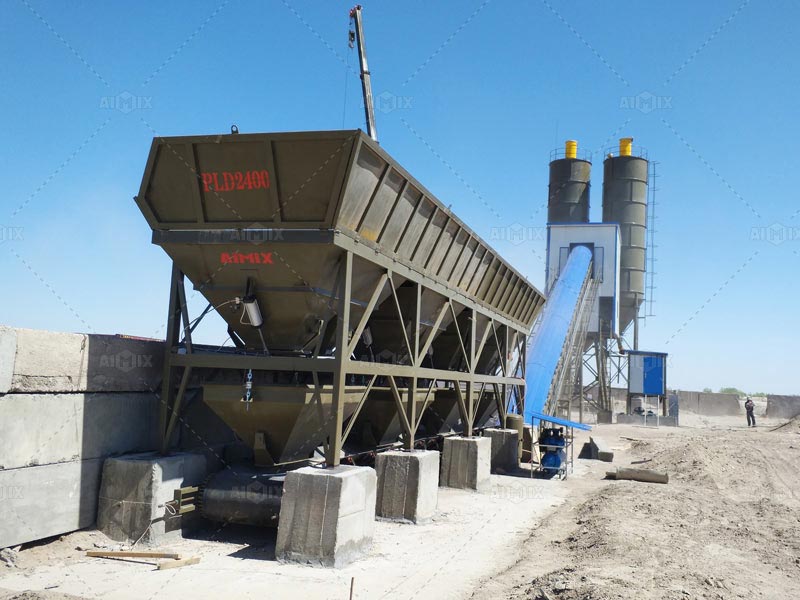What is the meaning of concrete plant? What does a concrete plant do? What are Concrete Plants?
A concrete batching plant, also known as a concrete mixing plant, is a specialized facility for efficiently blending various materials to produce concrete. Let me introduce, and you will know how profitable is a concrete plant.

Components of Concrete Batching Plant
A concrete plant consists of several key components. These components of concrete plants typically include:
- Aggregate Bin: Concrete equipment has aggregate bins. It holds essential ingredients in concrete production. Such as sand, gravel, and crushed stone.
- Transport system: Plant concrete also has a transport system. They ensure a steady flow of materials throughout the process. The concrete station hopper lifting system and belt conveying system of aimix can be very good for material transportation.
- Cement Silos: Concrete plant equipment has cement silos. They store cement, a binding agent crucial for concrete formation. Aimix provides integrated, split, horizontal, vertical, and other types of Cement Silos, to meet your production needs.
- Mixing Unit: The heart of the concrete mixing plant. It blends the aggregates, cement, water, and any supplementary materials to create the concrete mixture.
- Control System: The control system of the concrete mixer plant allows operators to adjust settings. It controls the entire production process. Aimix provides a team of experts to design the most suitable plan for a concrete mixture plant for you.

Types of Concrete Batching Plants
Are there different types of concrete plants? Concrete mixing plants come in various types to meet different project requirements.
What types of concrete plants are they? What is the use of concrete mixing plant? Here are the answers of what types of concrete plant are they.
For major infrastructure projects: Stationary Batching Plant
The stationary concrete plant mixer is fixed in a specific location. A stationary concrete batching plant is often used for major infrastructure projects. Such as highways, bridges, dams, and airports. It is also suitable for constructing commercial and industrial buildings. For example, factories, shopping malls, and office complexes. Stationary plants can efficiently produce large quantities of concrete.


For projects with frequent relocation: Mobile Batching Plant
Mobile mix concrete plant offers flexibility and versatility. So the mixing plant is suitable for a wide range of construction projects, particularly those that require frequent relocation or are located in remote areas.
A mobile mixing plant is often used for road construction projects. Including highways, expressways, and rural roads. Infrastructure projects such as bridges, tunnels, railways, and water infrastructure also need mobile concrete batching plants. Mobile mixing plants can be quickly deployed to different project sites.


For projects that continue to require concrete: Dry Mix Concrete Plant
In this concrete mixing station, all the ingredients except water are mixed before being loaded into the mixer truck. The truck then adds water during transit. A dry mix plant has high production efficiency.
Dry mix concrete plant is commonly used in construction sites where the demand for concrete is intermittent or where access to ready-mixed concrete is limited. It allows construction teams to mix concrete as needed, reducing waste and ensuring freshness.
For projects that need high-quality concrete: Wet Mix Concrete Plant
Wet concrete mixing plant equipment mixes all the ingredients including water before loading into the mixer truck. This results in a more consistent mix.
A wet concrete production plant is commonly used in large construction projects. Such as highways, bridges, airports, and high-rise buildings. They can produce high-quality concrete, meeting the demands of such projects efficiently.
What are the different types of concrete mixing plants? I believe you already have the answers. Aimix offers different types of concrete batching plants to suit your project needs.
How does a concrete plant work?
How do concrete plants work? What is the working process of concrete mixing plant? Let’s look at the answers to these questions. This will help you know what is needed for a concrete plant.
Concrete Batching Plant with Benefits
Is owning a concrete plant profitable? The answer is right. The concrete batching plant offers several benefits that contribute to efficient and high-quality concrete production. Here are some of the key advantages of using concrete batching plants.
- Improved Efficiency: Concrete batching plants automate the mixing process. So it enhances overall project efficiency.
- Cost Savings: Concrete batching plants can use materials efficiently and reduce waste. It results in cost savings for construction projects employing batching plants.
- Flexibility: Concrete batching plants can be customized to accommodate a wide range of mix designs and production requirements. It provides flexibility to meet project needs.
- Environmental Benefits: The plant is designed for environmental sustainability. It has incorporated features such as dust collection systems and water recycling facilities to minimize environmental impact.


As the construction industry continues to develop, concrete-mixing plants are important in shaping the world around us. If you want to know how long does it take to build a concrete plant, how to build a concrete plant, how do I start a concrete plant business, click here to learn more about aimix machinery.
Get in touch with us today for reliable service and exceptional results!



